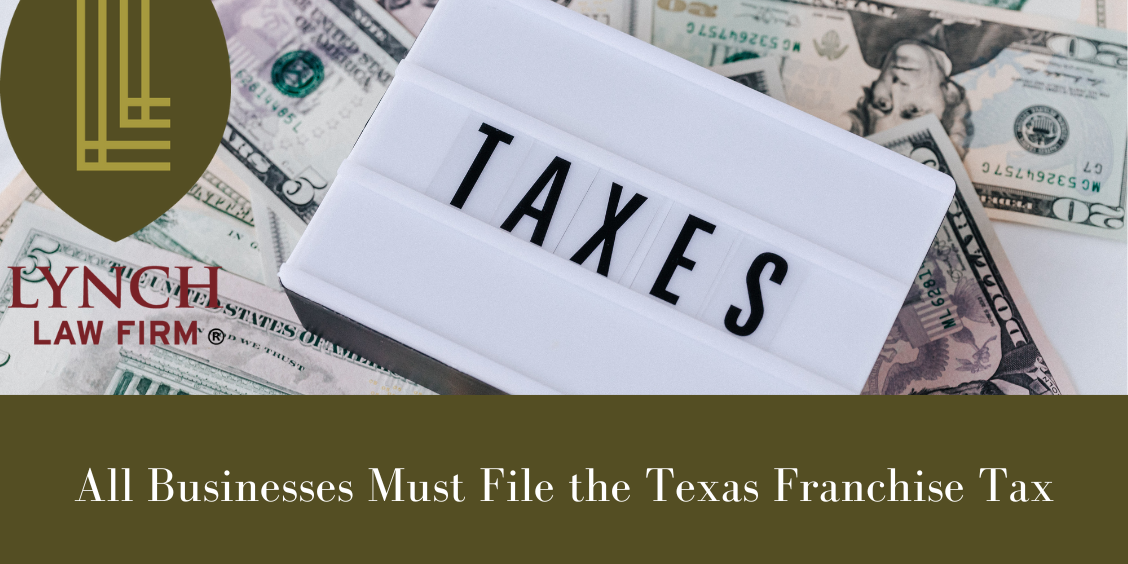
Time to Schedule Your Annual Repost
A Reminder From the
LYNCH LAW FIRM
THE TEXAS FRANCHISE TAX:
A Tax Report Every Business Must File Every Year
Even when no franchise tax is due, businesses are obligated to file the report each year to stay in compliance with the law. Reports should be submitted to the Texas Comptroller of Public Accounts or your local equivalent. With the income threshold of $1,230,000 in Texas, some companies are not required to pay any franchise tax, but everyone must submit an annual federal and state filing.
When to Submit Your Annual Franchise Tax Reports
The annual franchise tax report is due May 15 in Texas. When May 15 falls on a weekend or holiday, the due date will be the next business day. The Comptroller’s office may grant an extension of time to file a franchise tax report upon timely receipt of the appropriate form.
How We Can Help
Although your organization’s CPA typically submit an organization’s Texas Franchise filing, some out-of-state or less experienced CPAs do not complete this additional local task for their clients. Just respond to this message and provide us with your tax-ready revenue annual financial records and Texas Comptroller identification numbers if you would like us to submit this information on your behalf. We can also help you if your entity is out of compliance or needs to be reinstated with the comptroller.
Filing State Documents
The State of Texas is only one of six states that do not collect entity income tax. Texas businesses are instead required to pay what is called a “Franchise Tax.” The Texas Franchise Tax is the state’s primary tax on businesses, and companies pay an annual fee to Texas for the privilege of doing business in this state. The Franchise Tax is unrelated to an entity’s status as a franchise.
Who Pays Texas Franchise Tax?
All taxable entities formed, organized, domiciled, or doing business in Texas, with an annual revenue of at least $1.23M, are subject to the franchise tax this year. Exceptions include sole proprietorships not registered as LLCs, passive partnerships, and certain non-profits and trusts. In Texas, the annual Franchise Filing is paid through the Texas Comptroller. Most Texas-based CPAs can easily file these documents for their clients, but some out-of-state tax professionals may be unfamiliar with the process. There is an equivalent paperwork and taxation scheme in each state.
Entities Subject to Franchise Tax
Every taxable entity formed in Texas, doing business in Texas, or chartered in Texas must file and pay a franchise tax. These entities include:
Corporations.
Limited liability companies
Banks.
State-limited banking associations.
Savings and loan associations.
S corporations.
Professional corporations.
Partnerships (general, limited, and limited liability).
Trusts.
Professional associations.
Business associations.
Joint ventures; and
Other legal entities.
How to File Your Texas Franchise Tax Report
Franchise annual income thresholds, tax rates, and deduction limits vary by report year. The Comptroller of Public Accounts of the U.S. State of Texas recently published a memo on the annual revenue thresholds for the state’s Franchise Tax, including the new values for the years 2022 and 2023. The memo states that the “No Tax Due Threshold” for 2022 and 2023 is 1,230,000.00 USD. But even if no tax is due, all businesses need to comply with state laws and remain in good standing by filing a Texas Franchise Tax Report every year.
Penalties and Interest for Non-Payment
A $50 penalty is assessed on each report filed after the due date.
If tax is paid 1-30 days after the due date, a 5 percent penalty is assessed.
If tax is paid over 30 days after the due date, a 10 percent penalty is assessed.
Past-due taxes are charged interest beginning 61 days after the due date.
The Consequences of a Failure to Pay Texas Franchise Tax
Loss of Corporate Privileges
In Texas, a company’s failure to file franchise tax returns, or pay the franchise tax liability, can cause the organization to lose its limited liability protections. One of the primary purposes of creating a corporation is to ensure asset protection and preferential tax status. When a company fails to file franchise tax returns in Texas, its failure to comply causes it to forfeit its entity privileges.
Personal Liability
When the legal privileges of a business entity are forfeited in Texas, officers and directors of the company become vulnerable because they have no limited liability protection. The best way for those in management to limit their exposure is to file past-due franchise tax reports, pay the amount due, and reclaim the company’s good standing.
Fees and/or Termination of the Entity
Consequences for the failure to pay can include the assessment of fees or the entity's termination. While fees may be negotiated down for first-time offenders, after the second offense, the state will begin the process of termination.
Conclusion
It is always prudent for Texas business entities to comply with their legal obligations and file their Texas Franchise Tax for every entity every year. While the tax consequences are generally small, failure to pay can result in severe consequences.
About Labor and Employment Attorney Natalie Lynch
Attorney Natalie Lynch is the managing shareholder of the Lynch Law Firm, and she specializes in labor and employment law. Natalie is the only consulting and credentialed investigator in Central Texas who conducts third-party investigations into allegations of harassment, discrimination, hostile work environment, and other issues. Natalie is also a credentialed investigator and dispute resolution mediator with the experience required to help employers minimize employment risk factors.
Schedule a Consultation with the Lynch Law Firm Now
If you are an employer with questions or are seeking to resolve a labor and employment issue, protect yourself, your employees, and your business by contacting the Lynch Law Firm now. Email us or call 512 298 2346